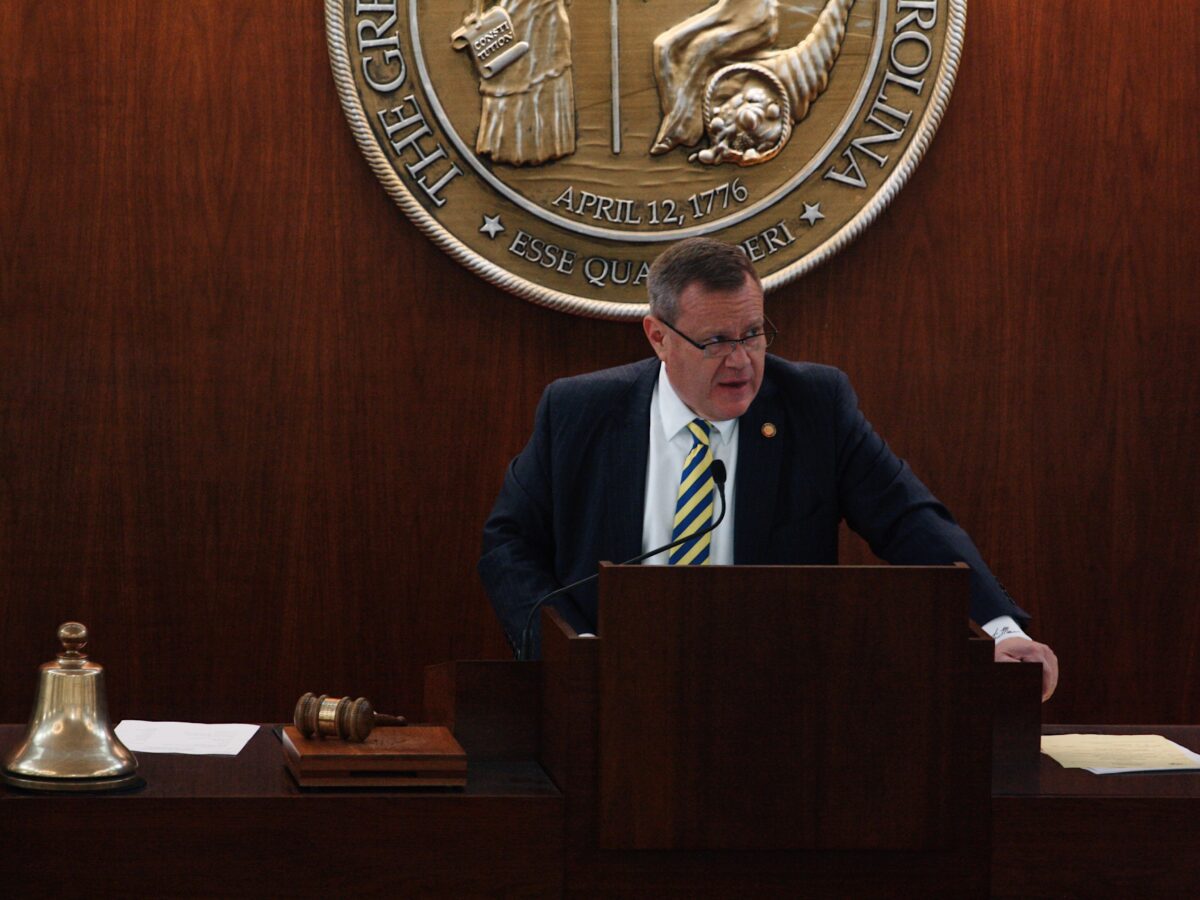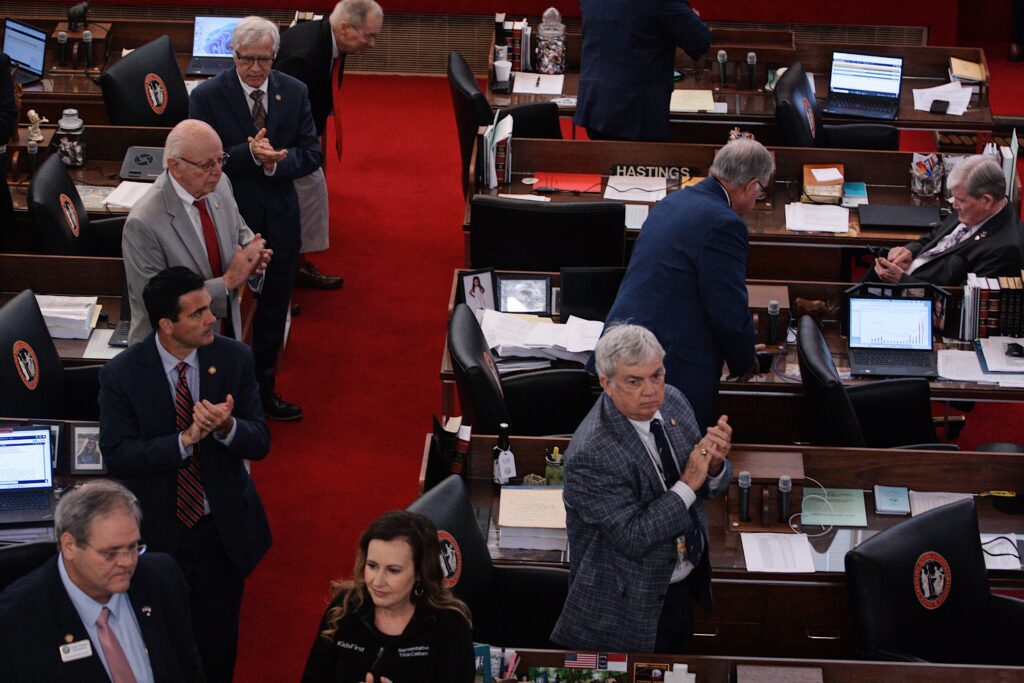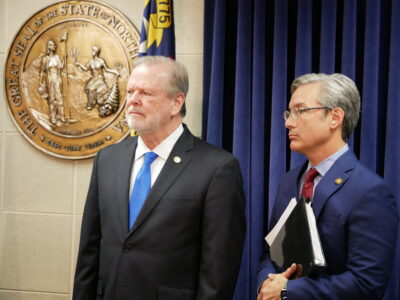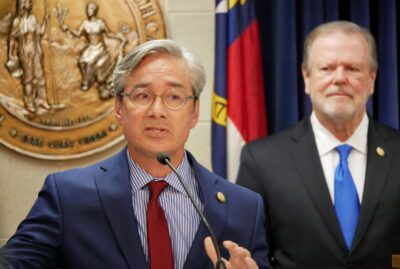
|
|
The Republican-led General Assembly passed North Carolina’s new $30 billion budget with bipartisan support on Friday, leading to the expansion of both Medicaid and private school vouchers through the Opportunity Scholarship Program.
President Pro Tem Sen. Phil Berger, R-Rockingham, who previously called the proposal the “largest expansion of school choice” since the state started the Opportunity Scholarship program 10 years ago, said the new budget “puts student outcomes and parental choice ahead of bureaucracy.”
That expansion – much of which was first outlined in the Senate’s budget, passed in May – adds $250 million to the Opportunity Scholarship Grant Reserve over the biennium, putting the revised appropriation for the reserve at $618 million over the next two years. The budget also removes all income eligibility requirements for recipients, starting with the 2024-25 school year.
In comparison, the budget allocates $480.4 million to implementing a new teacher salary over the biennium. Republican leaders say the budget gives teachers an average pay raise of 7% over the biennium, but that number is not explicitly in the budget.
Most other state employees — including community college personnel — will receive a 7% raise over two years.
Sign up for the EdWeekly, a Friday roundup of the most important education news of the week.
During Thursday’s voting sessions, many Democrats harshly criticized the budget, specifically naming the large investment in private schools through vouchers, rather than investment in public schools.
“I cannot in good conscience support a bill that siphons money from public schools, (and) provides raises to state employees and educators less than inflation,” House Minority Leader Rep. Robert Reives II, D-Chatham, said in a statement.
The 625-page bill text for the compromise budget was finally made public on Wednesday afternoon, nearly three months after the new fiscal year started. The first round of voting on the budget started less than 24 hours later on Thursday morning.
Democratic Gov. Roy Cooper released his two-year spending plan in March. The Republican-led House passed its budget in April, and the Republican-led Senate passed its own budget in May.
Despite the Republicans having a supermajority in the state legislature, it took them five months to develop and pass a compromise budget — and it passed nearly three months into the new fiscal year.
On Friday morning, Cooper said he was “directing our Department of Health and Human Services to begin today the process for expanding Medicaid while allowing this budget to become law without my signature.”
“Make no mistake,” he said in his statement, “overall this is a bad budget that seriously shortchanges our schools, prioritizes power grabs, keeps shady backroom deals secret and blatantly violates the constitution, and many of its provisions will face legal action.”
Below, you can find a brief look at what’s in the budget for educators and school staff. EdNC will publish its comprehensive analysis of major education items in the new budget next week, including more on early child care and community colleges.
The money report for the budget is also available on the General Assembly’s website.

Teacher pay
A National Education Association (NEA) report from April ranks North Carolina 36th in the nation for average teacher salary and 46th for average teacher starting salary.
The budget gives larger raises to beginning teachers, with raises decreasing with years of experience. Those base salary raises range from 3.6 to 10.8% over the biennium.
Beginning teacher pay is set to increase from $37,000 to $41,000 over the next two years, according to the budget – an increase of 10.8%.
When you compare the proposed salary schedule for 2023-24 to last session’s teacher salary schedule, which is the one currently in place, the increase for teachers with 15 years or more of experience is a 3.6% raise over the biennium, or about $188 per month, before taxes.
The budget says teachers will also get step increases and could qualify for advanced teaching roles.
Moore said on Tuesday he would “frankly have liked to have seen more raises,” the News & Observer reported, but “this was a compromise position that we took with the other chamber.” He said he would like to “beef up” the raises for 2024-25 next long session.
Here are the new proposed schedules.
The budget does not include anything about reinstating master’s pay, which was included in the House proposal.
Teachers paid on the new salary schedule can receive the following supplements:
- Licensed teachers who have NBPTS certification shall receive a salary supplement each month of 12% of their monthly salary on the “A” salary schedule.
- Licensed teachers who are classified as “M” teachers shall receive a salary supplement each month of 10% of their monthly salary on the “A” salary schedule.
- Licensed teachers with licensure based on academic preparation at the six-year degree level shall receive a salary supplement of $126 per month, in addition to the supplement provided to them as “M” teachers.
- Licensed teachers with licensure based on academic preparation at the doctoral degree level shall receive a salary supplement of $253 per month, in addition to the supplement provided to them as “M” teachers.
- Certified school nurses shall receive a salary supplement each month of 10% of their monthly salary on the “A” salary schedule.
- School counselors who are licensed as counselors at the master’s degree level or higher shall receive a salary supplement each month of $100.
The budget also allocates $10.9 million in recurring funds both years toward salary supplements for teachers serving in advanced roles, in districts participating in the Advanced Teaching Roles program. For eligible teachers in such districts, adult leadership teachers will receive a $10,000 supplement. Classroom excellence teachers will receive a $3,000 supplement.
Local teacher supplements vary widely by district. The budget allocates $60 million in additional funding over the biennium for the Teacher Supplement Assistance Allotment, which provides salary supplements for rural counties, bringing that revised net appropriation to $200 million.
The Senate budget also instructs the State Board of Education to create a consolidated bonus program for the biennium “to reward teacher performance and encourage student learning and improvement.” Then, the board must study and report back to the General Assembly on “the effect of the program on teacher performance and retention.”
That program administers bonus pay to qualifying teachers based on a number of criteria, such as whether they teach advanced courses, teach CTE courses, or meet a set of growth criteria. To read more about the program, go to the bottom of page 143 in the bill text of the budget. The bonuses will be awarded based on data from the 2022-23 and 2023-24 school years.
There is also a signing bonus for teachers in small county and low-wealth counties, of up to $1,000 state matching funds for teachers in qualifying districts. The program is to be established by the Department of Public Instruction (DPI).
Finally, there is $450,000 in recurring funds both years to DPI “to support economics and personal finance professional development for teachers.”
Pay for other school employees
Most other school employees – including school principals and non-certified personnel – will receive an across-the-board salary increase of at least 7% over the biennium.
There is also $4.8 million recurring each year of the biennium to implement additional 2% salary increases on top of the 7% for bus drivers in 2023-24.
For school psychologists, and school speech pathologists and school audiologists licensed at the master’s degree level or higher, the first step of the salary schedule is equivalent to the sixth step of the teacher salary schedule, $4,481 in 2023-24. In addition, these employees will receive a monthly salary supplement of 10% of their monthly salary, and $350. You can read more at the bottom of page 142.
Assistant principals will also receive raises based on a pay schedule.
For the 2023-24 fiscal year, beginning July 1, 2023, “assistant principals shall receive a monthly salary based on the salary schedule for teachers who are classified as ‘A’ teachers plus 19%. An assistant principal shall be placed on the step on the salary schedule that reflects the total number of years of experience as a certified employee of the public schools.”
Assistant principals with certification at the six-year degree level will receive a salary supplement of $126 per month. At the doctoral degree level, the monthly supplement will be $253.
The budget also proposes a new salary schedule for principals.


The proposal also outlines bonuses for principals based on statewide growth, on page 154, noting that principals can only receive one bonus, paid at the highest amount for which the principal qualifies. The budget does not include anything about principal licensure, but it is included in House Bill 432.
Finally, the budget also funds a salary increase for state Superintendent Catherine Truitt — $14,512 in 2023-24 and $29,024 in 2024-25.
‘Parents’ Bill of Rights,’ teacher pipeline, and more
Here are a number of other items of note for educators in the new budget:
- The budget extends the implementation of new legislation, commonly known as the Parents’ Bill of Rights, to Jan. 1, 2024. The budget also clarifies that parents will not need to be notified or provide consent when school personnel act in a medical emergency.
- There is $2 million over the biennium to create a grant program for eligible teacher apprentices to receive funds to cover tuition for educator preparation programs, and salary supplements if they become teachers.
- The budget also expands the NC Teaching Fellows Program to include 10 institutions, instead of eight, along with K-6 teachers. The program previously included only STEM and special education teachers. The scholarship amount is also increased from $4,125 to $5,000 per semester.
- There is $1 million in 2024-25 to cover fees for teachers pursuing National Board for Professional Teaching Standards (NCPTS). The program gives priority to teachers in low-performing schools, or schools where at least 10% of students are identified as at-risk. These funds are in addition to $1.0 million existing in federal Covid relief receipt in 2023-24.
- The budget also provides up to $4,600 per year, up to four academic years, to current teacher assistants as they pursue a college degree resulting in teacher licensure.
- There is $400,000 each year for N.C. Center for the Advancement of Teaching (NCCAT) to hire additional personnel and adjust current salaries to expand services. These additional funds are meant to help NCCAT to serve more teachers each year.
- The budget also includes $500,000 in the second year for computer science training for K-12 teachers across the state.
- There is also $12 million recurring over the biennium for classroom supplies.
- There is $600,000 each year for additional cybersecurity awareness training for all public school staff and teachers. This allocation is now $42.3 million each year.
- Finally, there is no provision to provide free school lunches. However, there is $6 million over the biennium “to offset the copays for students eligible for reduced-price lunches and breakfasts in schools participating in the National School Lunch Program and the School Breakfast Program.” The budget also eliminates penalties for unpaid student meal debt.
What questions do you have about the budget? Email me at hmcclellan@ednc.org, and I will try to include answers in EdNC’s comprehensive budget analysis next week.
Recommended reading




